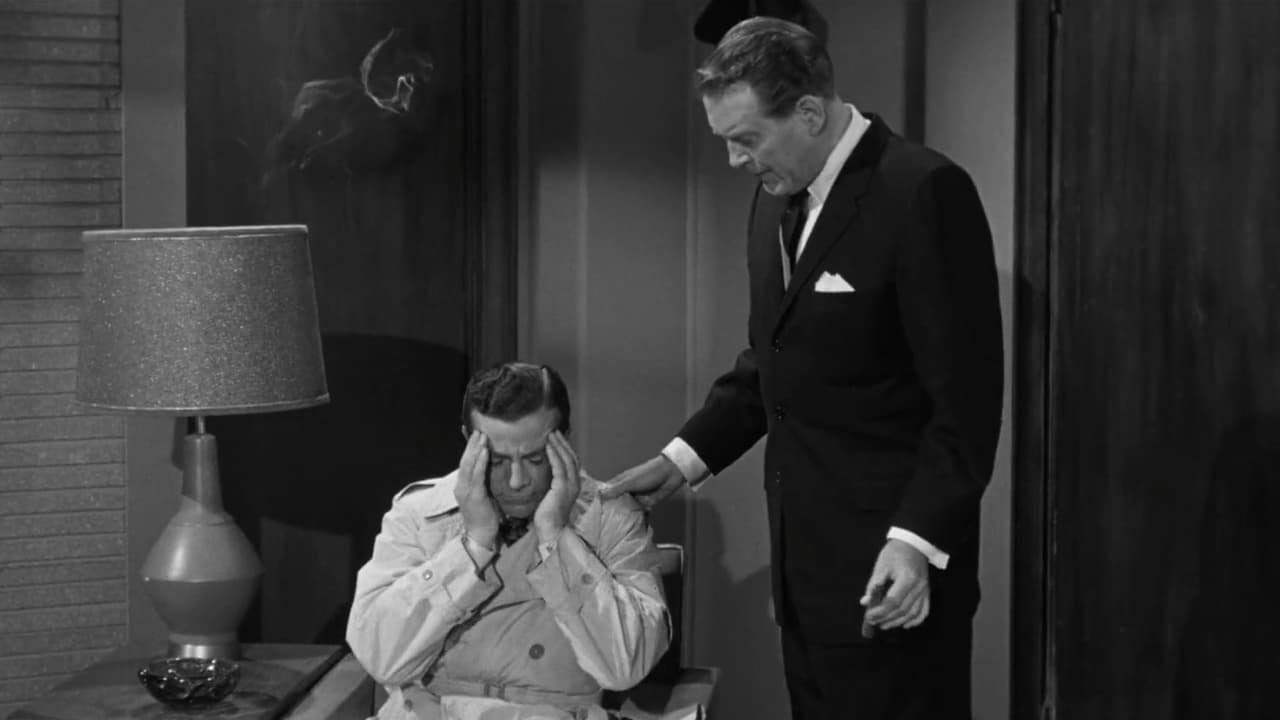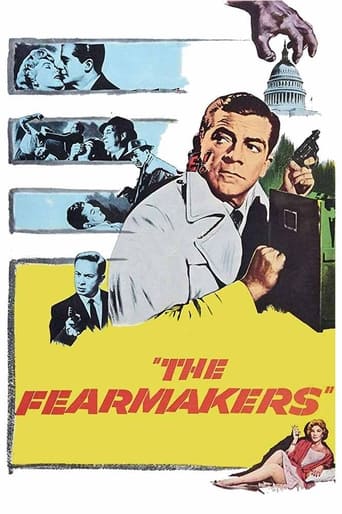

Despite the fact that it's a B movie,"The Fearmakers" from 1958 is absolutely fascinating to watch today. Directed by Jacques Tourneur, it stars Dana Andrews, Dick Foran, more well-known for westerns, and -- get ready - Mel Torme! And he was good! Andrews plays Alan Eaton, a public relations firm co-owner who fought in Korea and spent time in the enemy camp being tortured. Now back home, he suffers from headaches and blackouts occasionally. When he arrives at his old company, he finds out that his partner died and that the power of attorney he gave his partner was used to sell the business out from under him to Jim McGinnis (Dick Foran). McGinnis offers Alan a consultant job, and he is encouraged to take it by a Senator friend, who suspects shady business in the firm and wants Alan to check it out.Here's the shady business. The firm is suspected of using skewed polling data to make certain politicians look good. Alan has plenty to say about the way questions are asked in polls, and to whom, and he also has some things to say about lobbyists. Anyway, he needs to get his hands on the cards that apparently list the people polled or how they were chosen. He's also suspicious of his partner's "accident" and wants to gather information about that.Of course, today we call these shady people campaign managers, marketing people, Karl Rove -- I sat through the conversation about special interests and polling and thought I had entered the Twilight zone. I had -- it was 1958, and this guy had ethics that don't exist today since the types of things being referred to are acceptable.This film seems short for the material, and there are too many coincidences in the script to make it not totally believable. Andrews does a good job, but by this point had hit the skids - gone were the big 20th Century Fox films, possibly due to his alcoholism. Though he continued to act, he became a very wealthy real estate man and began speaking for the National Alcoholism Council in the '70s. He also served as President of the Screen Actors Guild. Dick Foran is appropriately slimy, and Mel Torme is excellent as an assistant who knows too much.Very interesting movie to view given today's political workings.
... View MoreDana Andrews plays a returning Korean War POW who learns that his public polling partnership was sold out from under him during his captivity. During the course of the film, he comes to realize how his partner was murdered by Communist sympathizers who turn the the firm into a public relations lobbying firm for subversive left-wing causes. We see the intricate web of scientists, intellectuals and fellow travelers who use K Street lobbyists for their plans for destroying America's defenses.This 1958 film exposes how public relation and lobbying firms manipulate public opinion to meet their aims and how a gullible public can be coerced. Fifty years later, this was successfully executed to perfection during the 2008 Presidential campaign.This film is ripe for a remake, although sadly the fifth columnists portrayed in this film, now firmly control Hollywood and would spin a tale about Karl Rove, Rush Limbaugh, FOX News and other fair and balanced voices.
... View MoreDana Andrews was taken prisoner during the Korean War and finally arrives home after being away for many years. But now he has periodic dizzy spells as a result of his brutal captivity. When he goes to Washington to meet his old business partner at a public relations office, he learns that his partner is dead and the business was sold out from under him to a guy that is obviously a jerk. After storming out of the office, Andrews meets with an old friend, a Senator, and learns that his old firm is doing a lot to distort truth and influence opinion--as they are a probable front group. Oddly, they never say "communist", but it's obvious that's what they intend. So, in order to expose this evil plot, Andrews returns and makes nice with the jerk and joins the firm.Generally, it's a pretty good curio of the time and it is one of the few chances you'll get to see Mel Tormé in an important role (though, oddly, he gets very low billing despite all his screen time). As always Andrews is very good, but towards the very end of the film the writers make a bad gaff--making the otherwise decent film really clichéd. This is when Andrews catches the baddies and is holding a gun on them. Just then, of all times, he gets a blinding headache and drops his gun!!! Come off it, this is just ridiculous and sets up an unnecessary final chase scene.Also, it's rather funny that the things the firm is doing to illegitimately influence public opinion and Congress are EXACTLY the same things many organizations do regularly today!! One example in the film is how they ask loaded questions that make it appear the public feels one way when they don't--something we see on news shows all the time today! Overall, it's not a great film but interesting enough to make it a little better than just a time passer, though fans of Andrews (like me) will probably enjoy it.
... View MoreThis low-budget 50's thriller has a treatment standard for its time, but the premise is fascinating. Dana Andrews plays Alan Eaton, a veteran of the Korean War who comes home (after years of being brainwashed as a POW.) When he returns to his Public Relations firm in Washington, DC, he is surprised to find it has been sold by his former partner, who later died; his own name has been retained only for the goodwill value he had generated. Soon after, he comes to suspect that the firm no longer uses polls and surveys to shape its PR campaigns, it conducts its surveys in accordance with a hidden agenda and shapes the data to meet its own demands. By the end of the film, the entire conspiracy (and its plot to get a man elected Governor) is exposed. Americans are free to believe everything they read, once again.Everything about the movie is just what one would expect from an inexpensive thriller from the era, and that's not bad at all. Probably the most appealing character is played by Mel Torme (Andrews is much too surly - and for good reason - to capture audience sympathy), a number-cruncher who remains oblivious to the moral implications of the data he is massaging for his employers. His best moment comes when he picks EXACTLY the wrong moment to strike up a conversation with Marilee Earle; the audience knows she can't possibly tear her attention away from a task she has been sent to perform, but we all know how it feels to want to break through another person's preoccupation.Thematically, the film bites off more than it is prepared to chew. The premise (that some distinct group may control a substantial part of the information we Americans receive every day) is both disturbing and plausible. We do our best to make sure that no single source can exert too much power over information, but we can never be sure just how much of the data we believe to be factual, is actually cooked up by people with an agenda. Exposing one conspiracy (as seen in The Fearmakers) does not stamp out all such conspiracies at once, and the film offers no hint of assurance that the public will be any wiser, the next time information is manipulated. One may extrapolate that there is a terrible danger in trusting ANY source of information, but no solution is suggested.A minor disappointment comes from another important topic that is introduced at the beginning and then thrown away: Eaton's brainwashing. He has apparently been subjected to gruelling torture and mind control in the recent past, but it has no effect at all on his behavior except to make him grumpy and subject to sudden headaches. Basically, this is used as a plot device which allows the bad guys to get the upper hand at times, but nothing in the story really turns on it. Perhaps after seeing The Manchurian Candidate, one's expectations are set too high; certainly one can't fault the scriptwriters, as the novel had not yet been published. The most unfortunate aspect of the movie is that a 1950's happy ending is predetermined. By the 1970's, filmmakers would be comfortable creating conspiracy stories with darker endings, and today it is difficult for viewers to accept a movie in which a problem like this one is completely solved. By current standards, the last few minutes of The Fearmakers are dreamlike and childish...and perhaps this explains some of the film's charm. I'd love to see a remake of the movie, set once again in the 50's, nearly identical right up to the end, and then have Alan Eaton wake up to discover that the conspiracy has NOT been neatly wrapped up at all. It's enjoyable to imagine a finale in which he runs, Kevin McCarthy-like through Washington DC, grabbing away people's newspapers and shouting "Where do they get their facts? Where do they get their numbers?" Who knows? Seems like they're making a lot of remakes these days, and this one would be do-able with a small budget...
... View More